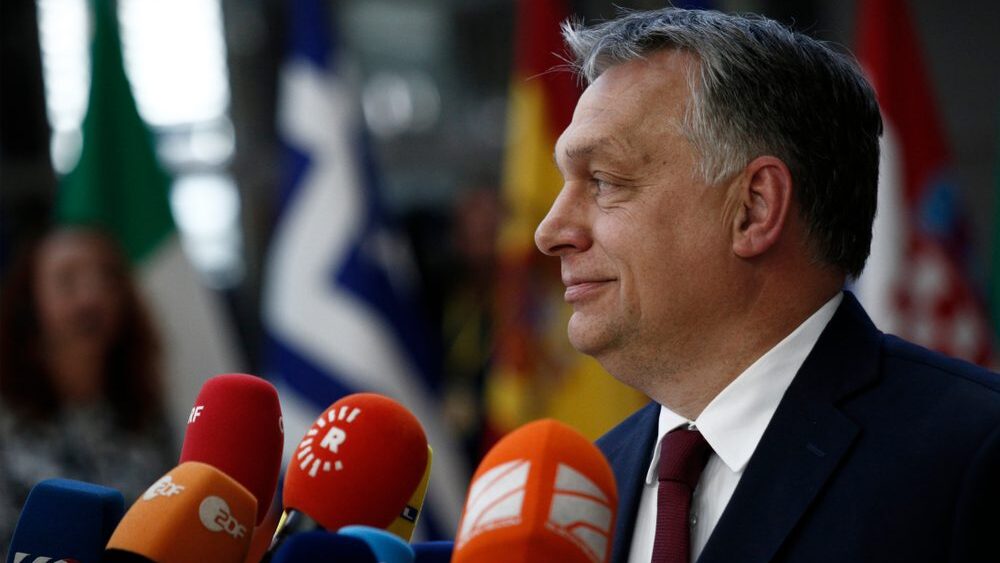
Hungarian PM Viktor Orbán in Brussels, 2018.
Photo: Alexandros Michailidis /Shutterstock
The European Commission’s recent recommendation to begin accession negotiations with Kyiv is “unfounded and poorly prepared,” failing to assess the enlargement’s true consequences, and therefore Hungary cannot support it during the next European Council Summit, Prime Minister Viktor Orbán wrote on X on Sunday, December 3rd.
Ukraine’s EU membership “does not coincide with the interests of many member states, certainly not with Hungary’s,” Orbán said.
This matter should not be put on the [EU Council’s December] agenda, and the Commission should understand that it is their responsibility that the meeting was poorly prepared. Take it back, prepare it properly, and come back when an agreement has been reached!”
It is clear that the proposal of the @EU_Commission on Ukraine’s EU accession is unfounded and poorly prepared. There is no place for it on the agenda of the December #EUCO ! pic.twitter.com/4uRFP4nEhx
— Orbán Viktor (@PM_ViktorOrban) December 3, 2023
The premier originally made the statements on Friday, during his weekly radio interview, then reposted several clips on his X profile throughout the weekend.
The prime minister also addressed Brussels’ narrative about Hungary supposedly preventing the EU from executing decisions that have already been made. There is no such thing as a veto in the EU treaties, the prime minister said, explaining that since certain decisions need unanimity to be made, when there’s no agreement, there’s no decision either.
“The EU is not in Brussels, the bureaucrats are there. The EU is Budapest, Warsaw, Paris, and Berlin. So if we, member states, all agree on certain subjects, then we have an EU position. If we don’t agree there is no common position.” Orbán said, referring not only to Ukraine’s EU membership but also the billions of euros worth of continued military aid.
We should not allow ourselves to be forced into a situation where we feel remorse for preventing the implementation of decisions made by others, when there are no such decisions.
We have every right to take part in making such a decision only if it corresponds to Hungarian national interests.
Orbán explained that there is no point in discussing Ukraine’s EU membership if it’s already clear that there’s going to be an agreement during the summit, recommending removing it from the agenda until a common position is formed.
The @EU_Commission didn’t do it’s homework. They want to shove Ukraine’s EU accession down our throats, without assessing the consequences for European taxpayers and farmers. This is nonsense! The Commission should go back to the drawing board. #Ukraine’s EU-accession shouldn’t… pic.twitter.com/DJ6QZ1OyNW
— Orbán Viktor (@PM_ViktorOrban) December 1, 2023
Furthermore, the prime minister explained why Hungary is currently against sending the proposed €20 billion worth of long-term military assistance to Ukraine. Funding an essentially frozen conflict with no foreseeable end in sight is just wasted money, he said, and Europe should focus on peace instead.
We should not finance the war, but a ceasefire, and then peace … This is our position.
Hungary is not the only country on this side of the aisle. Slovakia’s Robert Fico is also expected to vote against the start of the accession process and the disbursement of further funds, unless additional safeguards are introduced against corruption in Kyiv.
Orbán called for an urgent review of the EU’s Ukraine policy in November, signaling that Hungary will not support any measures moving forward unless the Commission is ready to compromise.
Attempting to salvage the summit, Council President Charles Michel traveled to Budapest last week to meet with Orbán and persuade him to drop his veto. The EU is even expected to finally unblock €10 billion out of Hungary’s €26.9 billion worth of cohesion and recovery funds still frozen by the Commission in the coming days, although—judging by these recent statements—it’s unlikely to change Orbán’s mind.
